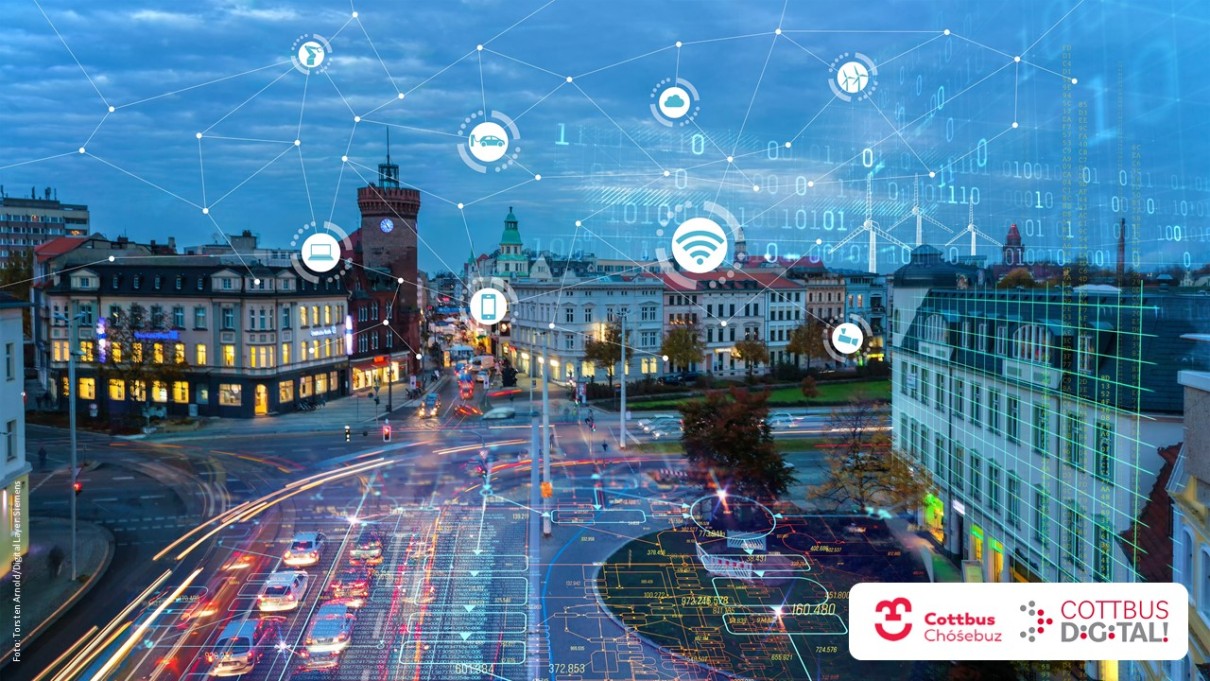Page content
Cottbus/Chóśebuz on the way to becoming a smart city

Digitalization promotes structural change in Cottbus/Chóśebuz. Image: Smart City Cottbus
Lignite was mined around Cottbus/Chóśebuz in Lusatia for over 30 years. The industry was the most important economic sector in the region, with thousands of people working in mining and coal extraction. With the end of mining almost 10 years ago, a new perspective had to be found for the town and its residents. This was one of the reasons for Cottbus/Chóśebuz to adopt the smart city concept at an early stage, says CDO Cathleen Rohr-Mehani: "The smart city concept offers us the opportunity to combine technological innovation with sustainable urban development. We see it as an opportunity to make Cottbus/Chóśebuz more liveable, efficient and future-proof.” With the digitalization strategy it developed, Cottbus/Chóśebuz was awarded the contract for the first round of the “Smart Cities Model Projects” funding programme in 2019 and is one of the first 13 cities to receive support from the Federal Ministry of Housing, Urban Development and Building (BMWSB) and the Kreditanstalt für Wiederaufbau (KfW).
Significant progress on the road to the smart city
The “Digital City of Cottbus” agenda includes numerous innovative measures. One central project is the first digital self-check-in system in a hospital, which ensures greater efficiency in the healthcare sector. With the “self-check-in”, patients can quickly and conveniently register themselves at the hospital. This significantly reduces the workload in everyday practice and increases the quality of service.
There is also an app for better coordination in the event of major incidents.
Local public transport is also becoming smarter: an adaptive traffic control system will ensure that streetcars and buses always have right of way and therefore reach their destination faster. Another step towards the future is the new on-demand public transport system, which is based on flexible and needs-based mobility solutions. “We are working on connecting public services so that citizens can use urban services via a central platform,” explains Cathleen Rohr-Mehani. A real highlight is the open data portal with a three-dimensional view of the city (3D city model), which creates transparency and invites citizens, businesses and planners to actively participate in urban planning.
Technologies as a key to transformation
Cottbus/Chóśebuz relies on digital tools and platforms to successfully implement the various smart city projects. Data loggers and sensors play a crucial role in this. For example, in energy monitoring in what are now 40 municipal buildings. This involves monitoring and evaluating consumption data such as heat, electricity and water in real time. “We identify inefficient operating modes or technical faults at an early stage and are able to realize energy savings,” says Cathleen Rohr-Mehani. The relevant data is measured every 15 minutes and automatically sent to those responsible by text message or email if limit values are exceeded. Real-time monitoring enables precise control, which improves the climate in daycare centers, schools and administrative buildings and reduces costs at the same time. In addition, consumption can be optimized in the long term by analysing this data.
Cottbus/Chóśebuz as a role model for other cities
The aim of the “Smart Cities Model Projects” funding program is to find innovative solutions locally, but also to be able to transfer these to other cities and municipalities. Cathleen Rohr-Mehani has a few learnings that she would like to pass on to other municipalities: “It is important to start small and initiate pilot projects that can be implemented quickly. This allows you to quickly gain experience and make successes visible, which also increases acceptance among the population. It is also crucial to involve all relevant stakeholders - from the administration to the business community and citizens - at an early stage. Cooperation and networks are the key to developing and implementing the best solutions.” As none of these projects can be realized on their own, Cathleen Rohr-Mehani also attaches great importance to the issue of capacity: “However, the possibly high personnel costs that have to be managed in addition to the daily work should not be neglected - or project groups should be formed that deal exclusively with the implementation of projects.”
Acceptance and challenges
“The reactions are predominantly positive, especially as many are already feeling the benefits of digitalization in their everyday lives,” says the CDO. “Of course, there are also skeptical voices, especially when it comes to issues such as data protection or changes to jobs. Here, we rely on transparency and active communication to dispel fears and build trust.”
It is also particularly important to involve older people. To this end, Cottbus/Chóśebuz offers training and user-friendly solutions that are easy to use even without prior technical knowledge: “Digital offerings should complement existing structures, not replace them.”
Digitalization as a driver of structural change
The fact that digitalization has become a key driver of structural change in Cottbus/Chóśebuz and the region has become clear in recent years. It enables the development of new economic sectors and promotes the energy transition. “The aim is to make Cottbus/Chóśebuz an attractive location for companies and skilled workers who are active in future-oriented industries,” emphasizes Cathleen Rohr-Mehani.
When will Cottbus/Chóśebuz become a smart city?
Those responsible in Cottbus/Chóśebuz see the smart city as an ongoing project. “A smart city is never really 'finished', as technologies and social requirements are constantly evolving.” Cottbus/Chóśebuz will be a smart city when digitalization is integrated into all areas of life and offers people real added value.
Become an exhibitor at #SCCON25
As a driving force for the future of digital administration and for equal digital living and working conditions in cities and rural areas, the Smart Country Convention is a must for all stakeholders who actively advance the digital transformation. Are you interested in advancing the digitization of our cities and municipalities too? Join us and position your company or municipality as an expert in digitalization in the public sector.



